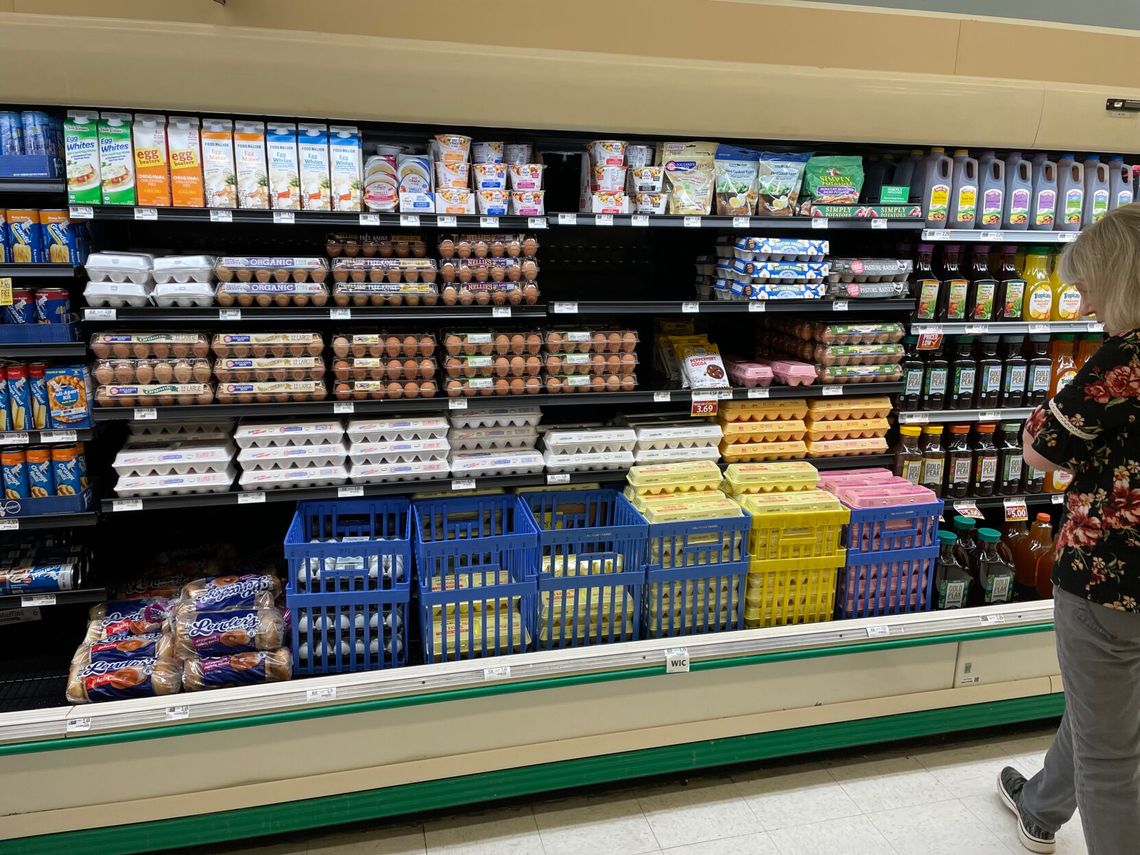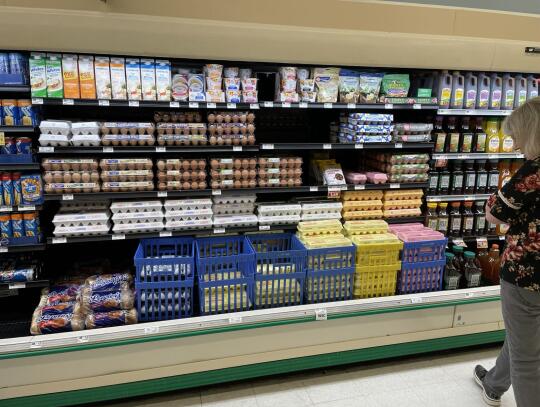Reasons eggs are so expensive right now
By DANNY BARTLETT
Staff Writer
Eggs are a staple of every day life packed with vitamins, minerals and protein.
Loaded with 13 essential vitamins and minerals, eggs also provide key sources of these important nutrients that are needed as part of a healthy diet to help you be your best, every day.
The average American eats nearly 300 eggs per year, up from around 250 per year in 2000, according to research. Mayo Clinic guidelines say it is okay to eat up to seven eggs a week for most individuals.
The cost to purchase this healthy item, though, is becoming more expensive to consumers. Prices have reached astronomical numbers and some local residents have voiced their concern.
According to the CPI (Consumer Price Index), the price of eggs has risen more than any other single grocery item at 59.9 percent. Butter and margarine is up 35.5%.
One farm group claims major egg suppliers have engaged in a “collusive scheme” to gouge and fix prices to boost profits, and called on the Federal Trade Commission to investigate.
“These prices make eating healthy catapult out of reach,” said Dawn Hanson. “The prices are EGGstremely hard on my budget!”
“I think the high price for a dozen eggs is ridiculous!” stated Mary Barnes.
“I am one of those who has their own chickens,” said Sherri Hickox. “Therefore I have my own eggs and have not had to buy any of those high-priced ones in the store.”
“Producers should demand more of a return on investments since that, too, has risen in price,” said Ware County High School Ag Teacher and FFA Advisor Lissi Chism.
Social media posts across the nation have also exploded.
“It’s so hard for families today to feed themselves eggs ... my God they are literally GOLDEN EGGS!” wrote a poster.
“I wish they’d (government) stop lying to us by calling this inflation. This is 100% price gouging and I am SICK OF IT,” wrote another.
The cost of a dozen eggs January 1980 was 88 cents. In January 2022 prices were $1.93. On average, prices have tripled for consumers since last year ($5.90) with a median of $4.25 and a high of $7.99.
Egg producing companies are racking up record-setting profits. Cal-Maine Foods, Inc., who accounts for approximately a quarter of U.S. egg consumption with sales in the mid-Atlantic, Midwestern, Southeastern, and Southwestern states, netted a 600 percent profit in one quarter on 110% in sales.
The company pointed to decreased egg supply nationwide due to avian flu driving up prices as a reason for its record sales, according Lydia Hu, FOX Business correspondent on America’s Newsroom.
From the same report, Cal-Maine issued a statement, “…higher production costs are also a factor in higher prices.”
A local producer’s daughter said, “Daddy only receives cents for a dozen, not even a dollar.” As is the case in most agricultural commodities, the farmer or rancher is in a “take what the middleman gives me” economy.
The business model used in the poultry industry is called vertical integration. Vertical integration is a strategy that allows a company to streamline its operations by taking direct ownership of various stages of its production process rather than relying on external contractors or suppliers.
A company may achieve vertical integration by acquiring or establishing its own suppliers, manufacturers, distributors, or retail locations rather than outsourcing them.
Most of the poultry industry is vertically integrated meaning they control most of the supply chain in the production of eggs and meat. From the acquisition of raw materials to the retail sales point to the consumer, poultry companies have varying degrees of vertical integration.
The avian flu, which has wiped out nearly 60 million birds to date reports from the CDC show, can’t be completely blamed for high egg prices at the supermarket. The “bird flu” has decimated before and those losses didn’t push egg prices skyward. There are other things at play contributing to high egg prices.
Recent events have created a perfect storm to send eggs prices soaring. Some of the components outside the Avian Flue contributing to record egg prices include rising feed costs, cage-free regulations, higher gas prices, seasonal reduction in laying, popularity of vegetarian, meatless and keto lifestyles, “designer” eggs, overall inflation, eggs being eaten at all meals.
New regulations to convert facilities to be cage-free is an added cost to egg producers. Additionally, a cage-free environment purportedly leads to aggression between the hens and a higher mortality rate as well as more broken eggs.
With the components out for cost increase, what does that mean for Easter? Can families afford to continue the tradition of egg hunting?
According to Insider, more than 180 million eggs are purchased around Easter, along with 16 million egg-dyeing kits! At prices right now, Easter will generate approximately $1 billion for the egg industry off consumers amounting to a huge profit.
Prices since 1980
(Dozen)
January 1980 $0.88
January 1981 $0.94
January 1982 $0.93
January 1983 $0.82
January 1984 $1.30
January 1985 $0.75
January 1986 $0.90
January 1987 $0.86
January 1988 $0.76
January 1989 $0.94
January 1990 $1.22
January 1991 $1.11
January 1992 $0.93
January 1993 $0.90
January 1994 $0.92
January 1995 $0.88
January 1996 $1.16
January 1997 $1.15
January 1998 $1.12
January 1999 $1.05
January 2000 $0.98
January 2001 $1.01
January 2002 $0.97
January 2003 $1.18
January 2004 $1.57
January 2005 $1.21
January 2006 $1.45
January 2007 $1.55
January 2008 $2.18
January 2009 $1.85
January 2010 $1.79
January 2011 $1.81
January 2012 $1.94
January 2013 $1.93
January 2014 $2.01
January 2015 $2.11
January 2016 $2.33
January 2017 $1.60
January 2018 $1.77
January 2019 $1.55
January 2021 $1.47
January 2022 $1.93
January 2023 $5.90
Photo by DANNY BARTLETT
A shopper contemplates the prices of eggs on display last week at the Food Lion in Waycross. The price of eggs has risen higher than any other grocery item at 59.9 percent.










